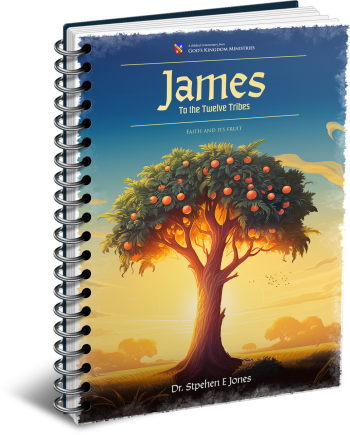Latest Posts
View the latest posts in an easy-to-read list format, with filtering options.

Many in the past have wrestled with the supposed conflict between James and Paul over the issue of law and faith. Both agree that faith needs "fruit" to be considered genuine. Spiral bound book.
Category - Bible Commentaries

James was concerned about the sin of pride and arrogance that seemed to characterize many of the merchants who were more successful in life than the average poor laborer. In James 4:6 he reminds his readers that “God is opposed to the proud, but gives grace to the humble.” In verse 10 he says, “Humble yourselves in the presence of the Lord, and He will exalt you.”
The normal manner in which men humbled themselves in those days was a little different from what we do today. According to Dake's Annotated Reference Bible,
“Mourners and penitents used to lie on the ground, and roll themselves in the dust. When forgiven, penitents arose from the earth and clothed themselves in clean and better garments.”
James tells us that God exalts or lifts the humble out of the dust. He continues, saying that those also who take the law into their own hands are judging the law and the Lawgiver. This is another example of arrogance that requires repentance and humility.
James gives us an example of arrogance in 4:13-15,
13 Come now, you who say, “Today or tomorrow, we shall go to such and such a city, and spend a year there and engage in business and make a profit.” 14 Yet you do not know what your life will be like tomorrow. You are just a vapor that appears for a little while and then vanishes away.
This repeats what James had written earlier in 1:10 and 11, likening the rich man's glory to “flowering grass” that passes away shortly. Isaiah 40:6 says,
6 . . . All flesh is grass, and all its loveliness is like the flower of the field. 7 The grass withers, the flower fades, when the breath of the Lord blows upon it; surely the people are grass.
Psalm 37:1 and 2 says also,
1 Do not fret because of evildoers; be not envious toward wrongdoers, 2 for they will wither quickly like the grass, and fade like the green herb.
This was a common metaphor in that part of the world. James applies it to those who arrogantly believe that they are in control of their own lives and masters of their own destinies. Many of the rich merchants were proud of their accomplishments and looked down on the poor as having less intelligence and therefore deserving of their poverty. James gives the solution in 4:15, 16,
15 Instead, you ought to say, “If the Lord wills, we shall live and also do this or that.” 16 But as it is, you boast in your arrogance; all such boasting is evil.
Such a statement recognizes the sovereignty of God and therefore expresses proper humility.
No doubt, James had Deut. 8:16-18 in mind:
16 In the wilderness He fed you manna which your fathers did not know, that He might humble you and that He might test you, to do good for you in the end. 17 Otherwise, you may say in your heart, “My power and the strength of my hand made me this wealth.” 18 But you shall remember the Lord your God, for it is He who is giving you power to make wealth, that He may confirm His covenant which He swore to your fathers, as it is this day.
Moses declared that God is the One who gives us the ability to “make wealth.” James admonished the merchants to humbly recognize this in all of their trading. Those who would attribute their wealth to their own will or ability should learn from the example of the Israelites when God brought them into the Promised Land. Deut. 6:10-12 says,
10 Then it shall come about when the Lord your God brings you into the land which He swore to your fathers, Abraham, Isaac, and Jacob, to give you great and splendid cities which you did not build, 11 and houses full of all good things which you did not fill, and hewn cisterns which you did not dig, vineyards and olive trees which you did not plant, and you shall eat and be satisfied, 12 then watch yourself, lest you forget the Lord your God . . .
All of the blessings of the Covenant are not obtained by one's own strength but by the providence and promise of God. Moses knew, however, that the Israelites would forget this and would corrupt themselves, because Deut. 31:29 says,
29 For I know that after my death you will act corruptly and turn from the way which I have commanded you….
This arrogance was one of the root causes of Israel’s rebellion against the law of God. This rebellion, in turn, was the cause of Israel’s dispersion when God judged them.
James sought to prevent this from happening again to the twelve tribes scattered abroad, as well as to the believers everywhere. A new Joshua (Yeshua, or Jesus) had arisen to fulfill His covenant and the promises of God. Perhaps James—like Moses—understood that the Church would corrupt itself once again.
We today are living in the time of the second appearance of Christ, and so we too are under the same admonition. In His first coming, Jesus came of the tribe of Judah, so He did not intend to fulfill the entire promise of God. Instead, it had to await His second appearance, in which He comes as Joshua the Ephraimite, for we know that the original Joshua was of Ephraim (Num. 13:8).
For this reason, what James wrote in his own time has greater application today, for we seek the fulfillment of the promises of God in the Birthright of Joseph-Ephraim. As Moses said in Deut. 8:18, God gave Israel this wealth “that He may confirm His covenant which He swore to your fathers, as it is this day.”
The covenant was made with the forefathers. The confirmation of the covenant occurred much later. The whole idea behind a PROMISE is to give men time to develop faith between the time of the promise and its confirmation (fulfillment). So it is also with the New Covenant. It was established in the first century, and the Church was given time to exercise faith and believe those promises during the Pentecostal Age.
We are now at the start of the Tabernacles Age, and Joshua-Jesus the Ephraimite is now bringing us into the next level of the Promised Land. It is no longer a tiny strip of land in the Middle East. It is the great Stone Kingdom of Daniel 2:35, which ”became a great mountain and filled the whole earth.”
To accomplish this will require both the authority and power of the Spirit through Jesus the Judahite as well as the blessings of the Birthright of Jesus the Ephraimite. But once again, we must guard against the arrogance of human nature which corrupted the Israelites under Moses and Joshua, as well as the Church in the New Testament during the Age of Pentecost. It is only by recognizing the sovereignty of God that we may have true humility that prevents us from usurping the Birthright and treating it as if we own it.
We are stewards of the Kingdom, not its owners. We may be “kings,” but there is a King of kings that has not relinquished sovereignty over those kings. Though God may give us the world, we are not its owners, but its stewards. James concludes this chapter by writing in 4:17,
17 Therefore, to one who knows the right thing to do, and does not do it, to him it is sin.
The right thing, in this specific case, is humility, which qualifies believers to rule the world under Christ. The Word of God gives us instruction in righteousness. Many have claimed faith in Jesus Christ as Savior, but fewer have faith in the Law (commands) of the King. As we read in 1 John 3:4, “sin is lawlessness.” Paul agrees in Rom. 6:19. The law gives us the knowledge of sin (Rom. 3:20), and when we know and understand what is “the right thing to do,” it is sin when we disobey.